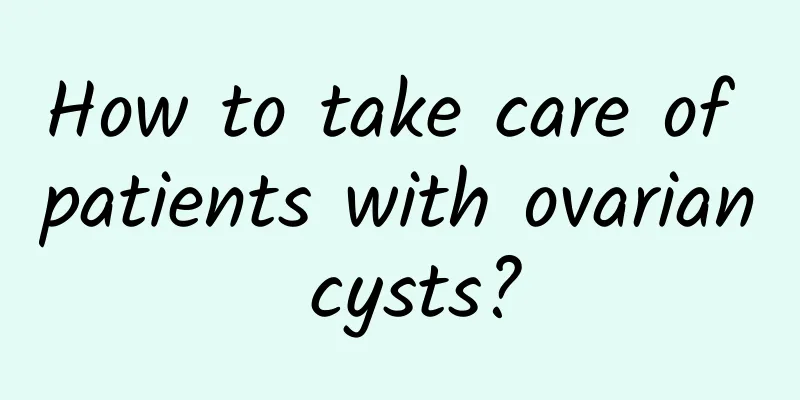Will an ovarian cyst go away on its own?

|
Will an ovarian cyst go away on its own? Ovarian cysts are one of the most common ovarian diseases in women. Many women find that they have ovarian cysts during physical examinations or medical treatment. Will an ovarian cyst go away on its own? Some women find ovarian cysts during physical examinations or gynecological visits, but after a period of reexamination, they find that the cysts have disappeared. Some patients will doubt whether there is a problem with the last examination results. In fact, some ovarian cysts do not require treatment and will disappear on their own after a period of time. What is an ovarian cyst? Ovarian cysts are more common in young and middle-aged women, and a few patients will develop them during puberty. Ovarian cysts are not tumors, and the probability of malignant changes is very low. Only in a few cases will they transform into ovarian tumors. Common types of ovarian cysts include follicular cysts, corpus luteum cysts, and lutein cysts, among which follicular cysts are the most common. The diameter of ovarian cysts is usually 1~3cm, and a few can exceed 5cm. Ovarian cord tumor examination items: 1. Radiological examination Dermoid cysts can show teeth and bones; intravenous pyelosalpingography can understand whether the fallopian tube is displaced, compressed, or infarcted, and identify wandering kidneys and retroperitoneal tumors; barium enema helps understand the condition of the intestine. CT scans can supplement lesions that cannot be revealed by B-ultrasound. 2. Ultrasound examination Important methods for diagnosing ovarian tumors are to detect the location, shape and size of the mass; cystic or solid; pelvic or abdominal cavity; uterine or adnexa; identify ovarian tumors, ascites and tuberculous peritonitis. Any mass larger than 2 cm in diameter can be detected, and the clinical diagnosis rate is greater than 90%. |
<<: What to do if your menstrual flow is light, long and continuous?
>>: What should I do if my menstrual period is extended by ten or twenty days and is always spotty?
Recommend
Is hydatidiform mole hereditary?
Molar pregnancy is not hereditary, but it is poss...
Can appendicitis cause pelvic effusion?
Can appendicitis cause pelvic effusion? 1. Append...
What are the treatments for habitual miscarriage?
Nowadays, many young lovers or couples do not pay...
Can pathological pelvic effusion be cured?
The treatment of pelvic effusion is actually the ...
The cream war of the century, natural beats artificial!
Whether it’s the fragrant thick slices of toast o...
Several common causes of dysmenorrhea among female friends
Dysmenorrhea is a common female disease, and dysm...
What should women eat during menopause?
On the one hand, menopause harms women's phys...
The tug-of-war between cherishing things and health! Can I still eat expired food?
Modern people have easy access to food, and many ...
What are the items to check for premature ovarian failure
What are the tests for premature ovarian failure?...
What to do if a girl has uterine prolapse
What should girls do if they have uterine prolaps...
Health killer: chronic cervicitis
Chronic cervicitis is often developed from acute ...
Can dysmenorrhea be cured?
Can dysmenorrhea be cured? Dysmenorrhea is a majo...
[Video version] Potatoes VS sweet potatoes, a big PK in weight loss! The winner is...
Sweet potatoes or potatoes, which one do you pref...
When soy milk meets tea, can it help you lose weight and prevent cancer?
After exercise, many people are accustomed to dri...
What should girls do if they are born without vagina?
Nursing of patients with congenital absence of va...









